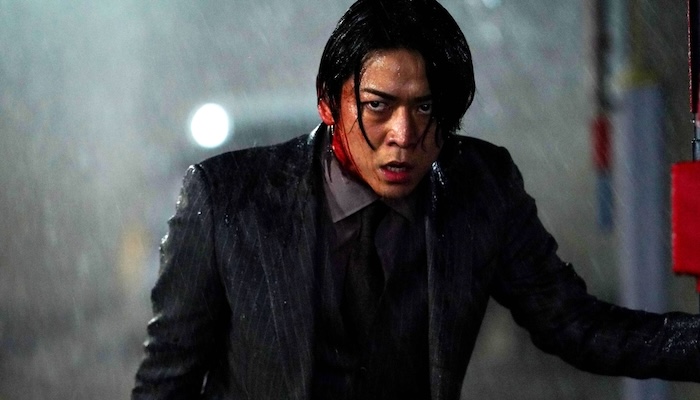TV Review: GOTHAM: Season 1, Episode 4: Arkham [Fox]
Fox‘s Gotham Arkham TV Show Review. Gotham: Season 1, Episode 4: Arkham brings cheap shock value and half-baked developments. Gotham is trying to do many things at once. It wants to shine new light upon multiple established Batman characters, it wants to add drama to the mix with its gritty narrative, and it’s always looking to expand its universe on the side. These are all commendable ends, but in Arkham, the means the show has adopted towards them all, along with the sheer diversity of tasks, have both come to an awkward head.
As the title suggests, the legendary Arkham Asylum figures heavily in this episode, as a condemned section of the city under political review for redevelopment. As usual in Gotham politics, corruption is rampant behind the scenes, as the two big gangsters in town, Carmine Falcone (John Doman) and Sal Maroni (David Zayas) bribe councilmen to further different agendas for the region (landfill vs low-income housing), which presumably entail running the district as well. Into this conflict steps an eccentric (though not so much by Gotham standards) hitman (Hakeem Kae-Kazim), taking out councilmen for making the “wrong” choices. In the process, the episode makes a somewhat amusing reference to the popular “Arkham” series of Batman video games, though doing so requires the location of the district to be changed from its traditional island to the inner city. Forced; yes, but it’s a pleasant sign of the times that video games are finally getting recognized as valid media.
Meanwhile, Oswald Cobblepot (Robin Lord Taylor) comes to visit Detective Jim Gordon (Ben McKenzie) and his wife, Babara (Erin Richards), pretending to be a “work friend” named Peter. Cobblepot has power in his sights, sees ways to prosper from a war that is dragging down most criminals, and isn’t opposed to working with Gordon to take them down, but in the process, he disrupts Gordon’s already troubled life; estranging his wife and threatening to ruin his reputation as the only good cop in Gotham. Oswald also pulls a fast one over on Sal Maroni, and elsewhere, Fish Mooney (Jada Pinkett Smith) furthers her own twisted conspiracy.
While important developments and conflicts occur throughout the episode, they don’t have the punch they should because what is unfortunately starting to seem like this show’s formula undermines their presence. “Villain of the Week” is a widely-derided trope for a reason; often seen as the opponent of plot and character development. To its credit, Gotham still makes sure to include these, but there’s not room for enough because it does, indeed, introduce a new villain every week; none of which has lasted so far. For example, it is fairly obvious that Penguin is being set up as the main villain in this series–at least for a while–but because of so many other villains competing for screen time, we only get to see fragments of his journey. We did not, for example, get to see how his threatening a hostage in Episode 2 played out, even though it could have been a perfect segue into organized crime, and here, he similarly gains a squad of henchmen with no explanation. Had he gotten more screen time to himself, they could have shown him ransoming off the hostage in exchange for large amounts of money, which he then used to hire the hoodlums; a predictable and trivial but more believable scenario. Sadly, the feeling that Oswald is becoming a Karma Houdini also hasn’t gone away; it is awkward that he’s set to blackmail Gordon with his reputation, while simultaneously gaining no infamy himself for murdering numerous people. In many regards, Fish Mooney is becoming the more interesting villain, because, in appropriate Batman style, she seems like a positive personality re-purposed for villainy. Mooney is a driven feminist with brains and ambitions, and she can be friendly, but she nonetheless manifests these traits in some very dark ways. It’s a bit of a tragedy that her ultimate purpose is likely to be killed by the Penguin.
The other reason Arkham struggles to deliver the punch it attempts is that, just four episodes in, the show has already exhausted much of its shock value. Thanks to the sheer audacity of the themes in past episodes, not only do we know when someone is going to kill someone else, we also know exactly how. It’s not shocking to see graphic violence anymore; simply unpleasant. The sort of macabre narrative Gotham aspires to can work–and has worked in this franchise–when it’s framed in the broader conventions of horror and suspense films, but not when it telegraphs its intentions to the extent it does here. When a show seems like it could benefit from some jump-scares, there’s clearly a problem.
All things considered, Arkham is easily the worst episode of Gotham that has aired thus far. By no means should it blemish the whole series, because the overall arc it touches upon is still interesting, but it calls attention to the most deficient aspects of the series, and makes one hope it can at least avoid dwelling on these aspects in the future.
Leave your thoughts on this review and this episode of Gotham below in the comments section. For more Gotham reviews, photos, videos, and information, visit our Gotham Page, our Gotham Google+ Page, our TV Show Review Facebook Page, subscribe to us by Email, “follow” us on Twitter, Tumblr, Google+, or “like” us on Facebook.
Related Articles
FilmBook's Newsletter
Subscribe to FilmBook’s Daily Newsletter for the latest news!













